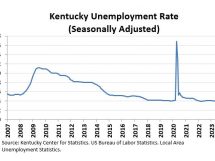Approves rural access recommendations
FRANKFORT, Ky. (June 21, 2013) — The Council on Postsecondary Education unanimously extended the contract of President Bob King, following an annual evaluation where he “exceeded expectations.”

“We are all very pleased with the tremendous work of President King. His evaluation is very, very positive and his performance has been outstanding,” said Chair Pam Miller at Thursday’s council meeting at Northern Kentucky University. Miller heads the Council’s Executive Committee, which conducted the evaluation.
King received an overall score of 4 on a scale of 1-5, with 4 being exceeds expectations, Miller said. State leaders, legislators, campus presidents, council members and council leadership staff rated King in a number of areas. The extension means that King’s contract runs through June 2017.
In other business, the Council on Postsecondary Education approved a set of recommendations that aim to improve postsecondary access and success in rural, economically distressed counties with low levels of educational attainment.
“We are very grateful to Chair Pam Miller and the members of the Rural Access Work Group. They devoted an enormous amount of time to help us understand the needs of rural Kentucky and mapped out recommendations to increase educational attainment so that these areas can grow economically,” King said.
The recommendations will be reviewed and prioritized for inclusion in the council’s annual plan of work.
Formed in October 2012, the work group explored the causes of perennially low educational attainment in rural pockets of the state, as identified in a March 2012 study conducted by the National Center for Higher Education Management Systems on the feasibility of making the University of Pikeville a public institution. Also guiding the work was the council’s strategic agenda that calls for increasing postsecondary access and success in all parts of the state.
Based on testimony and discussions, the group formulated more than 30 draft recommendations and then narrowed the field to 19 final recommendations in six broad areas. The areas include college affordability, college readiness and outreach, education and workforce alignment, partnerships between the Kentucky Community and Technical College System and university regional campuses, adult-friendly degree programs, and high speed Internet access.
In other action, the council unanimously approved a resolution reaffirming its commitment and continued support of the Kentucky Core Academic Standards and the collaborative work of Senate Bill 1 (2009).
Aligned with college and work expectations, the standards include rigorous content and application of knowledge through high-order skills. They build upon strengths and lessons of current state standards, and are internationally benchmarked and evidence-based.
The standards were approved by the council, the Education Professional Standards Board and the Kentucky Board of Education in a joint meeting of the boards in February 2010.
The council also gave final approval to tuition and mandatory fee proposals from the public institutions for the coming academic year. All proposals for in-state, undergraduate students fell within the maximum 3 percent tuition ceiling set by the council at its April meeting, and represents the smallest average tuition increase for Kentucky public institutions in 15 years.
The tuition action also maintained the existing floor for nonresident, undergraduate rates at least two times the resident rate with exceptions, and set rates for graduate students and online courses.
The council heard a report on “Student Financial Aid Funding Challenges” presented by Dr. Carl Rollins, CEO and executive director of the Kentucky Higher Education Assistance Authority and the Kentucky Higher Education Student Loan Corporation.
“Our first priority must be to secure all of the state student financial aid funding pledged by statute, and then address the vast unmet need for Kentucky’s most vulnerable students,” said Rollins.
In other action, the council:
♦ Approved tuition reciprocity agreements with Ohio, Illinois, Tennessee and West Virginia to provide broader access and opportunity for students at reduced tuition charges and reduce costs by utilizing programs in other states. The agreements are for defined areas or institutions in each state.
♦ Approved an amended administrative regulation amendment for private college licensing.
♦ Approved new academic programs, including a bachelor of science in community health, bachelor of science in business/bachelor of arts in business in logistics and supply chain management, all at Murray State University; master of science in health science at Northern Kentucky University; and master of arts in teaching English as a second language at the University of Kentucky.
♦ Approved a 2013-14 work plan for the council, which includes a clear set of policy priorities and tasks that will guide the work of the Council president and staff.
The council heard other reports on the following: student success, performance presentations on Kentucky Community and Technical College System and Northern Kentucky University, Council President, Commissioner of Education, budget development work group, GEAR Up Kentucky II, and Committee on Equal Opportunities.
The council welcomed its newest member, Dr. Joe Ellis, a doctor of optometry and owner of EyeCare Associates in Benton. Ellis was administered the oath of office by Judge Anthony Frohlich, circuit court judge with the Boone County Fiscal Court.
Before adjourning, the council approved resolutions of service for members C.J. Ryan and Nancy McKenney whose terms expire June 30, Eastern Kentucky University President Doug Whitlock who is retiring at the end of June, and council staff members Heidi Hiemstra and Tammie Clements.
The next meeting of the Council on Postsecondary Education is set for Sept. 12-13 in Louisville. It will be conducted in conjunction with the Governor’s Conference on Postsecondary Education Trusteeship.




















Add Comment